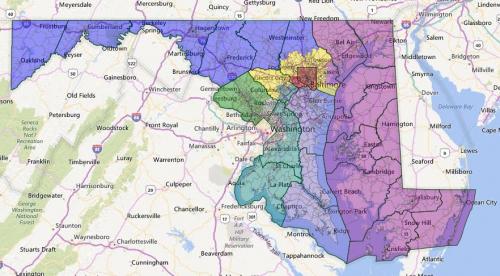JUSTICE | Redistricting Reform
Judge Williams has been selected to co-chair an Emergency Commission on Sixth Congressional District Gerrymandering by Gov. Hogan, who signed an executive order creating a nine-person commission — made up of three Democrats, three Republicans and three unaffiliated voters — to propose a new map. A spokeswoman for the governor said the panel would draft a new map by March 4. Hogan said former U.S. District Judge Alexander Williams Jr., a Democrat, and Walter Olson, a Republican, would co-chair the commission. The two currently co-chair Hogan’s Maryland Redistricting Reform Commission.
Read Full Article in the Baltimore Sun | November 26, 2018
Text From Baltimore Sun Article by Michael Dresser:
"Gov. Larry Hogan created an “emergency” commission on Monday to redraw the borders of Maryland’s 6th Congressional District, moving ahead on a new map despite state Attorney General Brian Frosh's appeal of a federal ruling that ordered the redraft.
At a State House news conference, Hogan praised the ruling by a three-judge panel that Maryland violated the rights of district residents in 2011 when then-Gov. Martin O’Malley and legislative leaders, all Democrats, set out to “flip” the district from Republican to Democratic.
The Republican governor said Frosh, who decided earlier this month to appeal the decision to the U.S. Supreme Court, “continues to be on the wrong side of this fight and the wrong side of history.”
Hogan also said Frosh, a Democrat, should have recused himself because he was in the state Senate when the map was drawn.
“Actions like these are exactly why Marylanders are fed up with politics as usual,” Hogan said.
Hogan signed an executive order creating a nine-person commission — made up of three Democrats, three Republicans and three unaffiliated voters — to propose a new map.
The governor’s decision puts the state on two paths in responding to the decision. As Maryland’s chief lawyer, Frosh is fighting to have the Supreme Court hear the case and rule before a new map is created. Meanwhile, Hogan, as chief executive, is pushing forward with an effort to comply with it.
The judges’ decision gave Maryland until March 7 to submit a new map for the 2020 election. However, the court has since granted a stay of its decision until the Supreme Court rules on the case or July 1 — whichever comes first.
An announcement on the governor’s webpage said the Emergency Commission on Sixth Congressional District Gerrymandering would hold hearings around the state. A spokeswoman for the governor said the panel would draft a new map by March 4. The governor’s order said he would put the final plan before the 2019 General Assembly as emergency legislation during its regular 90-day session, which begins Jan. 9.
Hogan said former U.S. District Judge Alexander Williams Jr., a Democrat, and Walter Olson, a Republican who is a senior fellow at the libertarian Cato Institute, would co-chair the commission. The two currently co-chair Hogan’s Maryland Redistricting Reform Commission. The governor said Ashley Oleson, state administrator of the League of Women Voters, would represent unaffiliated voters on the panel.
The governor’s office is inviting members of the public to apply for the remaining six positions. It said candidates for office, staff members of the General Assembly and the Hogan administration, Capitol Hill staffers and registered lobbyists would not be considered.
A spokeswoman for Frosh had no comment on the governor’s remarks. The office of Maryland House Speaker Michael Busch declined to comment. A spokesman for state Senate President Thomas V. Mike Miller couldn’t be reached.
Busch and Miller were two of the architects of the current map, drawn up after the 2010 census as required by the U.S. Constitution. While the 2010 election left Republicans in control of many states, Maryland was an exception. Democrats redrew the 6th District in a way that flooded it with voters from their party’s stronghold in Montgomery County. The map threw many Republican residents of the old 6th District into the 8th, where they, too, were outnumbered by Democrats.
The strategy worked. In 2012, Democrat John Delaney ousted longtime Republican Rep. Roscoe Bartlett, turning a 6-2 Democratic majority in Maryland’s U.S. House delegation to 7-1. The 6th District seat remains in Democratic hands.
The judges’ decision, if upheld, would require Maryland to redraw its district lines without consideration of voters’ party affiliation or voting patterns. Hogan endorsed that requirement Monday, charging the commission with drawing a map that is compact and respects city, county and other boundaries “to the extent practicable.”
It is not clear whether the state is required to redraw its entire congressional map for 2020. The judges indicated they would consider a map that only redrew the borders of the 6th and 8th districts, leaving an overhaul of the state map until after the 2022 elections.
Hogan also repeated his determination to bring back his proposed legislation to permanently put the drawing of congressional and General Assembly district lines in the hands of an independent, nonpartisan commission. His previous attempts pass the measure have been rejected by Democratic leaders without a floor vote.
The governor said he would have that bill introduced on the first day of the legislative session. “Free and fair elections are the very foundation of American democracy,” he said.



